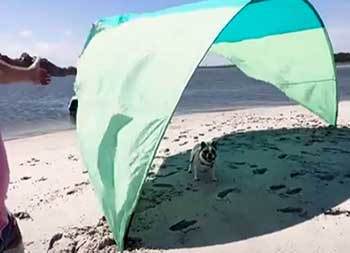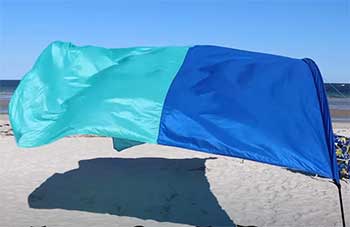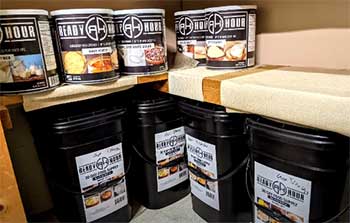When it comes to enjoying a sunny beach day, choosing the right shade is crucial. SunSail and Shibumi Shades are two popular options, each with unique strengths. SunSail offers durability and extensive coverage, perfect for those who prioritize stability and UV protection.
On the other hand, Shibumi Shades excel in portability and ease of setup, ideal for those who prefer convenience and lightweight gear. In this article, I’ll compare these two beach shades, exploring their pros and cons, to help you decide which one suits your beach-going needs best.
A Brief Comparison Table
| Feature | SunSail | Shibumi Shades |
| Setup Time | Moderate, requires some effort | Quick, minimal effort |
| Weight | Varies, typically heavier | Lightweight and portable |
| Durability | High, robust materials | Good, but can be affected by strong winds |
| Wind Resistance | Moderate to high | Excellent with consistent wind |
| Shade Coverage | Large, adjustable | Wide but fixed |
| Portability | Moderate, bulkier | High, fits in a carry bag |
| User-Friendliness | Moderate | Very high |
Pros And Cons of Sunsail
Pros:

- Durability: SunSail is known for its robust construction, using high-quality materials that can withstand various weather conditions. This makes it a reliable option for regular beachgoers.
- Shade Coverage: With its large, adjustable canopy, SunSail provides ample shade for families or groups. You can adjust the angle and height to maximize coverage throughout the day.
- Aesthetic Appeal: SunSail shades come in various colors and designs, adding a stylish touch to your beach setup.
- UV Protection: These shades offer excellent UV protection, shielding you from harmful sun rays.
Cons:
- Setup Time: SunSail can take some time to set up, especially if you’re not familiar with the process. It usually requires stakes and ropes, which can be cumbersome.
- Weight and Portability: These shades tend to be heavier and bulkier, making them less convenient to carry compared to some other options.
- Wind Resistance: While generally sturdy, SunSail may struggle in extremely windy conditions if not properly anchored.
Pros And Cons of Shibumi Shades
Pros:
- Ease of Setup: Shibumi Shades are incredibly easy to set up. With just one person, you can have your shade ready in minutes. This convenience is a major selling point.
- Portability: Lightweight and compact, Shibumi Shades come with a convenient carry bag, making them perfect for those who prefer a hassle-free beach experience.
- Wind Resistance: Designed to work with the wind, Shibumi Shades excel in windy conditions, providing stable and reliable shade.
- Environmentally Friendly: Made with sustainable materials, Shibumi Shades appeal to eco-conscious beachgoers.
Cons:
- Price: Shibumi Shades tend to be more expensive compared to other beach shades, which might be a consideration for budget-conscious buyers.
- Fixed Coverage: Unlike adjustable shades, Shibumi provides a fixed amount of coverage, which may not be ideal for larger groups or those seeking more customizable shade.
- Dependence on Wind: While great in windy conditions, Shibumi Shades can struggle to stay up without a consistent breeze.
Detailed Comparison of SunSail And Shibumi Shades

- Setup and Portability
From my experience, the setup process is a significant factor when choosing a beach shade.
SunSail shades, though durable and offering extensive coverage, can be a bit tricky to set up. It usually involves multiple steps, including anchoring stakes and securing ropes.
This can be a bit of a hassle, especially if you’re alone or in a hurry. However, once set up, it’s incredibly stable and provides excellent coverage.
On the other hand, Shibumi Shades are a breeze to set up. Literally. All you need is a bit of wind, and you’re good to go.
The lightweight design means you can carry it over your shoulder, and setting it up takes just a couple of minutes. This makes Shibumi Shades ideal for those who value convenience and portability above all.
- Durability and Wind Resistance
In terms of durability, SunSail shades have a clear edge. They’re made from high-quality, heavy-duty materials that can withstand harsh beach conditions.
Whether it’s the scorching sun or a sudden downpour, you can count on SunSail to hold up well.
Shibumi Shades, while durable, rely heavily on wind to stay upright. They’re designed to harness the wind’s power, which makes them incredibly stable in breezy conditions.
However, in the absence of wind, they can become less effective. This is something to consider if you frequent beaches with variable wind conditions.
- Shade Coverage and UV Protection
When it comes to shade coverage, SunSail offers more flexibility. You can adjust the height and angle to ensure maximum coverage throughout the day. This is particularly useful if you’re with a group or have a lot of gear to keep shaded.
Shibumi Shades provide wide but fixed coverage. They’re perfect for couples or small families but may not offer enough shade for larger groups. However, the shade they do provide is consistent and reliable as long as there’s wind.
- Price and Value for Money
Price is always a consideration. SunSail shades come in various price ranges, generally offering good value for the durability and coverage they provide. They’re a solid investment if you need a reliable, long-term beach shade solution.
Shibumi Shades are on the pricier side, but they offer unparalleled ease of use and portability. If you value convenience and are willing to pay a bit more for it, Shibumi is worth considering.
Real User Experiences

Hearing from other beachgoers can provide valuable insights.
Many users appreciate the sturdiness and extensive coverage of SunSail shades.
They’ve mentioned that once set up, it feels like having a mini oasis on the beach.
However, the setup process can be a common gripe, especially for those who aren’t particularly handy.
Shibumi Shades users often rave about how quickly they can set up their shade and get to relaxing. The lightweight design and wind-powered stability are frequently highlighted as major advantages.
Some users, however, have noted that on calm days, keeping the shade upright can be challenging.
Also Read: Shibumi Shade Competitors.
Frequently Asked Questions (FAQ)
Certain beaches have restrictions on Shibumi Shades due to their unique setup. These rules can vary, so it’s always best to check the specific regulations of the beach you plan to visit.
If you value ease of setup, portability, and don’t mind the higher price, then yes, Shibumi Shade is worth it. It’s particularly great for those who frequent windy beaches.
Hilton Head has specific regulations regarding beach equipment. Shibumi Shades are generally allowed, but it’s wise to verify with local guidelines before your visit.
Without wind, Shibumi Shades can struggle to stay upright. They’re designed to work with the wind, so on calm days, they may not provide the stability you need.
Conclusion: Which Shade Should You Choose?
Choosing between SunSail and Shibumi Shades ultimately depends on your priorities. If you value durability, extensive coverage, and don’t mind a more involved setup, SunSail is a fantastic choice.
On the other hand, if convenience, portability, and ease of setup are your top considerations, Shibumi Shades are hard to beat.
Personally, I find myself leaning towards Shibumi for its sheer convenience, especially when I want to hit the beach without any fuss. However, for family gatherings or longer beach outings, SunSail’s robustness and adjustable coverage make it a winner.
Remember, the best shade is the one that fits your lifestyle and beach habits. Hopefully, this detailed comparison helps you make an informed decision so you can enjoy your beach days to the fullest!

